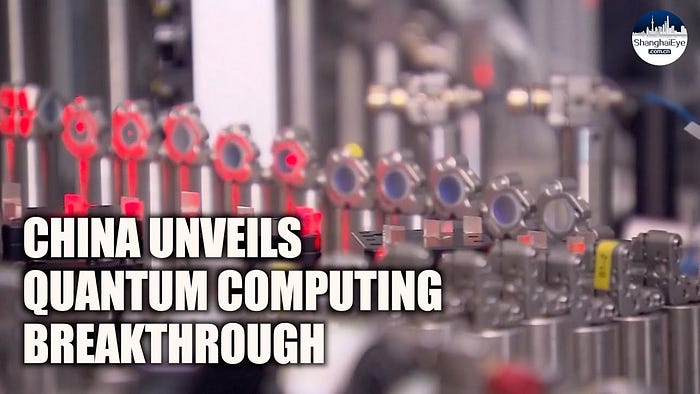
Quantum Computing’s Sputnik Moment
General Mark A. Milley, chairman of the Joint Chiefs of Staff, recently expressed grave concern about China’s reported test of a hypersonic missile: “I don’t know if it’s quite a Sputnik moment, but I think it’s very close to that. It has all of our attention.” Maybe it should be, but General Milley may have missed the real 21st century version of a Sputnik moment: China has claimed huge breakthroughs in quantum computing.
It’s inside baseball to those of us who are neither computer experts nor quantum physicists, but let’s put it this way: the countries/companies that dominate quantum computing will dominate, full stop. Healthcare included.
I won’t pretend to understand quantum computers or try to explain how they work, but they’re to “traditional” computers as those computers are to, say, a calculator, or to an abacus. They’re much faster — like a quantum leap faster — and can quickly do computations that would take even traditional supercomputers centuries to complete, if ever. For example, think you’ve got an unbreakable code? Unless you’ve got the fastest quantum computer, think again.

The Global Times reported that a Chinese research team had achieved a 66-qubit programmable superconducting quantum computing system that is 10 million times faster than the fastest supercomputer and more than a million times faster than the previous fastest quantum computer, Google’s Sycamore. And, oh-by-the-way, China has a second quantum computer that uses photons (light) instead of electricity, and that is “1 septillion times faster than the world’s fastest existing supercomputer,” according to the Xinhua News Agency.
Hey, look, there’s a hypersonic missile over there!
Skeptics quibble over the speed comparisons — much depends on the problem and how the computers are programmed — but, as IFLScience wrote:” …with regards to sampling problems, it appears quantum computers are finally significantly better than conventional options.” Bill Fefferman, a University of Chicago computer science professor, told ZDNet: “Early experiments hint that this technology will hold the promise to solve very interesting problems that cannot be solved classically.”
It’s not like Google is resting on its laurels. This summer it used Sycamore to create “time crystals,” a new form of matter that appears to not obey the second law of thermodynamics (i.e. entropy always wins). What this means for quantum computing, or for physics more generally, isn’t yet clear, but it’s a big breakthrough.

Meanwhile, Amazon and Caltech are partnering to establish a new branch of the AWS Center for Quantum Computing on the Caltech campus. The shared goal is “is to create quantum computers and related technologies that have the potential to revolutionize data security, machine learning, medicine development, sustainability practices, and more.” It’s the first such corporate partnership for Caltech.
Caltech professor Oskar Painter, who also heads quantum hardware at AWS, stresses that these are still early days for quantum computers: “If we were to just take today’s ideas and go forward with them, we would create a dinosaur of a quantum computer.” Fellow Caltech professor Fernando Brandão, who also heads up quantum algorithms at AWS, says: “There’s a new paradigm in computing. It’s not just about making our current computers a little bit faster or a little bit better as we have been seeing in the last 50 years at least. It’s about building a completely new kind of computer.”
Nadia Carlsten, head of Product for the AWS Center, is looking for, shall I say, quantum breakthroughs: “The quantum algorithms that have the most potential for significant impact, for example in industries like manufacturing or pharmaceuticals, can’t be solved by simply expanding today’s quantum technologies.”
IBM has also made quantum computing a major focus, stating that quantum computing “is on the verge of sparking a paradigm shift.” Microsoft and Intel are also betting big on quantum computing, as are more specialized companies like Cambridge Quantum Computing, D-Wave, and Rigetti Computing.
Healthcare is a big reason why. Read any article about the potential impact of quantum computing and healthcare is always listed as one of the top two or three sectors it will impact (the military, of course, is another common one). For example, the AWS announcement referenced “medicine development,” ZDNet just published “Eight ways quantum computing is going to change the world” that listed “Discovering new drugs” as #1.

The article notes: “Quantum computers, however, have the potential to one day resolve the molecular simulation problem in minutes… This would mean that life-saving drugs, which currently take an average 10 years to reach the market, could be designed faster — and much more cost-efficiently.”
David Cowan, one of the major investors in Rigetti, explained to Forbes’ Kevin Dowd why he was so keen on quantum computing: “I mean, simply put, curing cancer.”
Mr. Dowd goes on to elaborate:
Perhaps the most exciting applications of quantum computing are in medicine. There are trillions of atoms in each cell and trillions of cells in the human body, all interacting with each other in an unceasing biological dance. Current superconductors are seriously powerful machines, but unspooling that kind of choreography is beyond their reach.
This is not going to happen overnight. Quantum computers are not quite stable, not quite flexible, not quite available. Your local hospital or physician group probably has more immediate concerns. One hospital CIO told Becker’s Hospital Review: “I expect it will likely take another 3 to 5 years of innovation in hardware and subsequent applications to develop a quantum computing ecosystem that can truly benefit the healthcare industry.”
That is probably a safe bet, but changing to a new technology in 3 to 5 years means that most health organizations would have needed to start looking it 3 to 5 years ago. It’s a safe bet that the big health insurers, and huge health systems like The Mayo Clinic or The Cleveland Clinic, are already thinking about it.
If you believe that Big Data, artificial intelligence, synthetic biology, internet of things, or confidentiality of patient records are going to be important in healthcare — and I certainly do — then quantum computing is going to be important as well. That “internet” you think you know and rely on now? We may be in early days of quantum computers, but people are already working on the “quantum internet.”
The world is going to change, and quantum computing is going to make possible many of the things that are going to change it. Healthcare should take the latest developments as a Sputnik moment.
